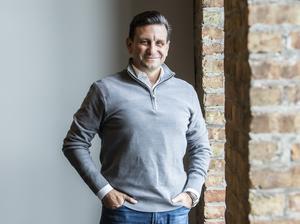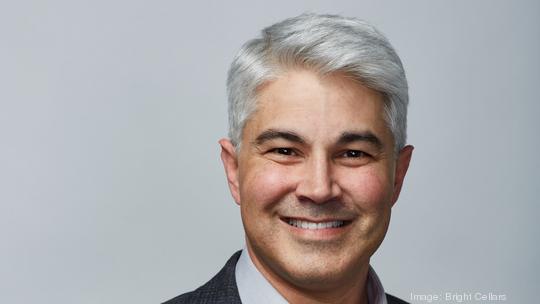
Earlier this month, Joe Megibow left his job as CEO of a $700 million-plus publicly traded company with thousands of employees to lead a relatively small Milwaukee startup that's not yet profitable.
Megibow said he took the leap because he sees a massive opportunity for Bright Cellars Inc., the locally based wine subscription box business where he recently became CEO. He also resonates with the company's mission of making wine more accessible for everyone.
"If you think of the moments of joy in your life, they're often paired with wine. And who doesn't want or deserve joy?" Megibow said. "In simple terms, I'd love to see a bottle of Bright Cellars wine on every dinner table in America."
Bright Cellars onboards users with a taste preference quiz and then sends them monthly boxes of personalized wines it curates or produces. Its annual revenue is around $40 million, according to the company.
The previous Bright Cellars CEO was co-founder Richard Yau, who remains a member of the company's board. Megibow formerly was the CEO of Purple Innovation Inc. (Nasdaq: PRPL), a direct-to-consumer company in Lehi, Utah, known for its gel grid mattresses. Before that, he held several senior roles with online travel company Expedia Inc. and clothing retailer American Eagle Outfitters Inc.
Megibow grew up in Kansas and currently lives in the Bay-area suburb of Lafayette, California. He plans to stay there, where he's about an hour from the Bright Cellars distribution center and production partner in the Napa Valley region. Although the company's headquarters is in Milwaukee, he's leading a remote team that has almost 100 employees across the country.
Wisconsin Inno recently talked with Megibow about why he joined Bright Cellars and the opportunities he sees for its growth. The following interview was edited for clarity and length.
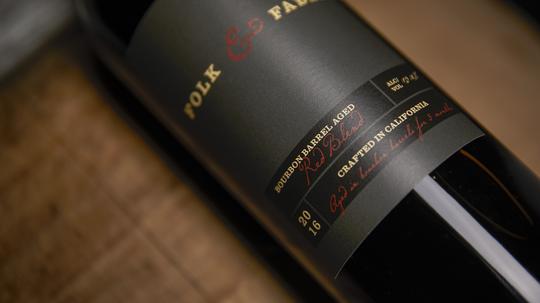
How did you hear about Bright Cellars and why did you decide to join?
"The investors (and) the board ran a very traditional search with a boutique, top-shelf executive recruiting firm. ... I fell in love with the concept from conversation one.
"I probably fall into the category of people who love wine but I'm not particularly fond of wine culture. ... It almost feels like the whole category is designed to make you feel stupid. The idea that at the dinner table, you've got to have an expert come out — a sommelier — to help you navigate what to order; imagine if that was true of everything on the menu. The whole industry is built around the idea that you can't possibly know what you want.
"In my mind, it's really simple: Wine is enjoyable and wine is something that is often paired with joy. ... That's the mission here — All these people who could or should have more joy in their lives and enjoy the wine, how do we get them educated, how do we get them into wine without having to get them all caught up and going to wine school ... and just get focused on: Wine is to be enjoyed.
"(If) we get that right as a business, what's really interesting, too, is it means we end up with uncanny insights about what our consumers like, what works for them (and) what resonates for them, which gets into a really cool feedback loop on making sure we are sourcing and producing the right wine, which makes for a very effective business model. It becomes very vertically integrated there, where we help customers determine what's right for them and then make exactly that."
What is the opportunity you see for Bright Cellars?
"I think most of the wine subscription companies have been focused on convenience for wine lovers. ... This is a massive category — $78 billion — so there's room for those kinds of players. ... We're looking at it differently. It's, 'How do we bring people into wine and sustain people into wine who don't yet have that connection, don't know what they want, aren't educated (about wine), and teach them."
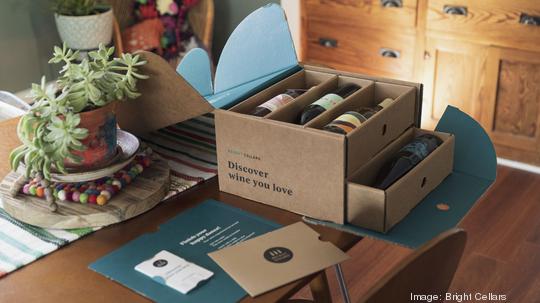
With that goal, is it advantageous for Bright Cellars to be based in Milwaukee, which isn't known for wine?
"The typical person (in Milwaukee) isn't being raised around wine. And wine is sort of this thing that is hard to understand and hard to get into. ... It turns out, it's not that difficult to know enough to actually be able to enjoy (wine) any time, all the time, and we're just taking a different approach. So sure, if we can take a great, spirited beer-drinking town like Milwaukee and teach them the joy of wine, we can do it anywhere."
What's Bright Cellars currently working on?
"Early adopters is one thing; going to scale is something else. So how do we get this right for every customer every time at scale? ... So focusing on that and getting the economics right so that on every transaction, we're contributing to the business, we're making money. It's something we're laser-focused on.
"As a young company, we're not as sophisticated as we should be. We have more of a one-size-fits-all solution and part of the point is there are different personalities and different tastes, and how can we better service each and every customer every time?
"It's a lot around just getting to know our customers better and making sure that we're getting it right most of the time. And the subscription, that's the make-or-break of the business. They vote with their wallets every month and either we're getting it right and they stick with us, or we're not and they don't. It's very measurable."
What are some of the metrics you're focused on?
"Right now, there's a lot of headwinds that all businesses are facing. There are things that are out of our control: The cost of the components of what we're selling, even just glass bottles ... has gone up. ... So you've got inputs that are expensive, freight and shipping inbound and outbound is remarkably high right now ... The cost to acquire a customer into the subscription program is increasingly expensive.
"Focusing on retention and lifetime value is the starting point here. ... If you give a really heavy discount on the first box, you're acquiring deal hunters, people who really only want that first box and have no intention of ever sticking with the subscription. That's not good business for us. So how are we acquiring the right customers? We are just laser-focused on getting that one box to the second box, that second box to the third box, and then we've got a business.
"One of the challenges in a young company is, you get so focused on just driving growth that you don't necessarily have the right kind of growth, which is where you never achieve profitability. I think there's really a pivot we're doing right now on making sure we're getting the right kind of revenue, which means we're actually profitable on a given customer to sustain all of these inputs and increased costs."
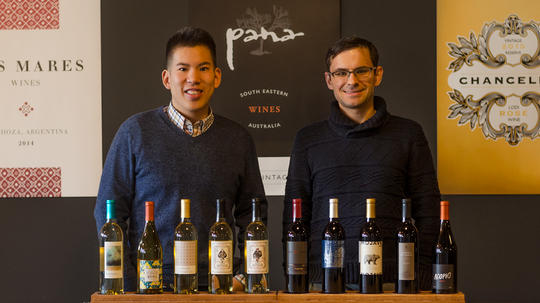
Why did the company seek a new CEO at this time?
"We had some really innovative founders who saw an opportunity and had that entrepreneurial spirit and zeal to try something no one else had done, and every person at Bright Cellars wouldn't have a job if it weren't for what they did. ... But scaling a business is hard, and managing a ton of people is hard, and those who create businesses aren't necessarily the ones who have fun operating larger businesses."
What are some of your short-term goals?
"As a company that is not yet profitable, managing cash is the lifeblood of this business and what often breaks startups. We've got some terrific investors ... so they are a hundred percent with us and making sure that we have the cash we need to run this business. But the duty I have is to be managing cash efficiently, investing in the right growth and as quickly as possible getting to a place (where) we own our destiny, that we're running an efficient, contribution-positive business.
"In a subscription business, it's getting that flywheel. It's acquiring the right kind of customers that we're sustaining and getting it right for them so it starts getting to a point (where) the business is producing cash. That's the whole game right now."

